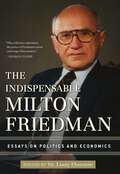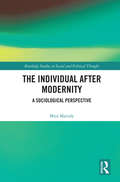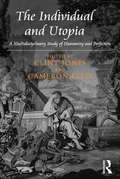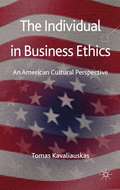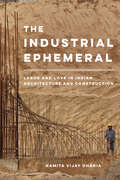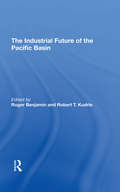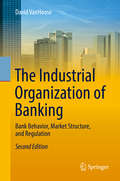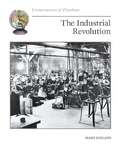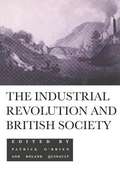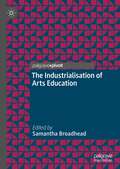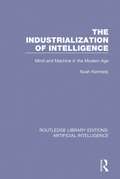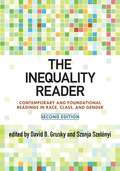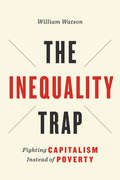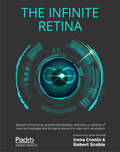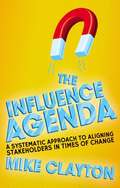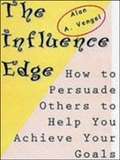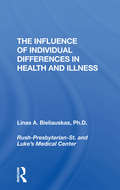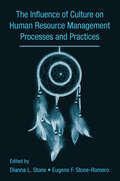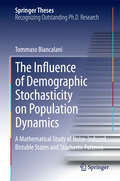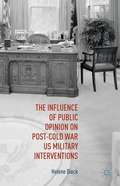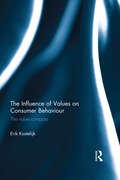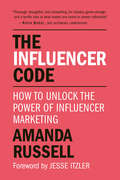- Table View
- List View
The Indispensable Milton Friedman: Essays on Politics and Economics
by Lanny EbensteinMilton Friedman is one of the most famous economists in history. His writings and theories on everything from capitalism and freedom to deregulation and welfare have inspired movements, influenced government policies, and changed the course of America's economic history.Now, acclaimed Friedman biographer Dr. Lanny Ebenstein brings together twenty of Friedman's greatest essays in his new book, The Indispensable Milton Friedman: Essays on Politics and Economics. The only collection of Friedman's writings to span his entire career, The Indispensable Milton Friedman: Essays on Politics and Economics features some of Friedman's never-before-republished writings as well as the best and most timeless of his works.These exceptional essays not only illuminate the progression of Friedman's thought, but explain how America might overcome some of its most difficult challenges. Broken into two sections, politics and economics, The Indispensable Milton Friedman shows how we can ultimately turn America around, and is more necessary than ever during this critical election year and time of economic uncertainty.
The Individual After Modernity: A Sociological Perspective (Routledge Studies in Social and Political Thought)
by Mira MarodyMoving beyond the individualisation paradigm in sociological theory, this book develops an approach to the analysis of human activities and the social phenomena produced by them that centres on the processes that generate coordinated behaviours among individuals. Emphasising the relational and processual character of social phenomena, as well as the importance of a broader cultural and historical context for analysing them, the author questions the view of contemporary society that sees individuals acting in a context in which social bonds are dissolving, and unveils the rationale hidden behind the chaos of everyday activities. Through an analysis of the continued importance of cooperation and the consequent emergence in society of various kinds of communities, this volume examines the changing character of social ties. An overview of transformation of social bonds and the intensification of mutual influences among individuals as they seek to address social dilemmas in new contexts, The Individual after Modernity will appeal to social scientists with interests in social theory.
The Individual and Utopia: A Multidisciplinary Study of Humanity and Perfection
by Clint Jones Cameron EllisCentral to the idea of a perfect society is the idea that communities must be strong and bound together with shared ideologies. However, while this may be true, rarely are the individuals that comprise a community given primacy of place as central to a strong communal theory. This volume moves away from the dominant, current macro-level theorising on the subject of identity and its relationship to and with globalising trends, focusing instead on the individual’s relationship with utopia so as to offer new interpretive approaches for engaging with and examining utopian individuality. Interdisciplinary in scope and bringing together work from around the world, The Individual and Utopia enquires after the nature of the utopian as citizen, demonstrating the inherent value of making the individual central to utopian theorizing and highlighting the methodologies necessary for examining the utopian individual. The various approaches employed reveal what it is to be an individual yoked by the idea of citizenship and challenge the ways that we have traditionally been taught to think of the individual as citizen. As such, it will appeal to scholars with interests in social theory, philosophy, literature, cultural studies, architecture, and feminist thought, whose work intersects with political thought, utopian theorizing, or the study of humanity or human nature.
The Individual in Business Ethics: An American Cultural Perspective
by Tomas KavaliauskasToday we are witnessing social and political dominance of large corporations. They provide for its employees moral values and business principles. Moreover, they institutionalize their codes of ethics. The theory of Business Ethics provides the moral guideline and standards for corporate life and concrete business organizations apply those standards to practice. The individual employee, as a member of a business organization, accepts those standards. Therefore, it is important to examine the foundation of the individual's moral value in Business Ethics in order to understand on what the foundation of the moral value depends on. This highly interdisciplinary text is a critique of Business Ethics as an ideology and life politics. The author discloses how contemporary business ethics grovels before corporations, how it is too weak to create a truly critical voice of American capitalist economy. The individual's treatment in corporate life is revealed through the eyes of American Protestant culture and its coercive work tradition where efficiency value usurps values of individual choice and freedom. This book suggests a new concept of an out-corporate individual.
The Individual, Marriage and the Family
by Lloyd SaxtonA truly inter-disciplinary approach, this text incorporates biological, psychological and sociological perspectives to the study of the family.
The Industrial Ephemeral: Labor and Love in Indian Architecture and Construction (Atelier: Ethnographic Inquiry in the Twenty-First Century #7)
by Namita Vijay DhariaWhat transformative effects does a multimillion-dollar industry have on those who work within it? The Industrial Ephemeral presents the untold stories of the people, politics, and production chains behind architecture, real estate, and construction in areas surrounding New Delhi, India. The personal histories of those in India's large laboring classes are brought to life as Namita Vijay Dharia discusses the aggressive environmental and ecological metamorphosis of the region in the twenty-first century. Urban planning and architecture are messy processes that intertwine migratory pathways, corruption politics, labor struggle, ecological transformations, and technological development. Rampant construction activity produces an atmosphere of ephemerality in urban regions, creating an aesthetic condition that supports industrial political economy. Dharia's brilliant analysis of the sensibilities and experiences of work lends visibility to the struggle of workers in an era of growing urban inequality.
The Industrial Future Of The Pacific Basin
by Roger Benjamin Robert T KudrleThe consequences of changing comparative advantage are transforming the economic landscapes of nations and regions around the globe. This book deals with the most significant economic factors in the rapidly changing Pacific Basin area. Part 1 considers the area’s changing patterns of industrial development and trade and examines the general implications of such changes for national industrial development policies. Part 2 consists of a set of case studies of national industrial policies in the context of factors affecting industrial structures; how applicable these policies are to other countries in the region is a central theme. Part 3 addresses the specific issues of foreign investment and domestic labor in relation to economic growth and industrial development in the Pacific Basin. Finally, in Part 4 institutional arrangements are suggested that would facilitate economic growth while, at the same time, mitigating the serious negative consequences of changing economic advantage. Such negative consequences are to some extent pervasive and can destabilize social and political development and endanger formal and informal alliances; nevertheless, the segment of humanity that has adequate food, clothing, and shelter is being permanently widened in the Pacific Basin.
The Industrial Organization of Banking
by David VanhooseThis book aims to provide a thorough overview andevaluation of the organisation of banking. It examines the interplay among bankbehaviour, market structure, and regulation from the perspective of a varietyof public policy issues, including bank competition and risk, marketdiscipline, antitrust issues, and capital regulation. New to this edition arediscussions of substantial regulatory restructurings, the economic foundationsof international banking, macroprudential regulation, and internationalcoordination of banking policies. The book can serve as a learning tool andreference for graduate students, academics, bankers, and policymakers withinterests in the industrial organization of the banking sector and the impactsof banking regulations.
The Industrial Revolution (Cornerstones of Freedom)
by Mary CollinsA history of the Industrial Revolution focusing primarily on the United States during the nineteenth century and on the change from an agrarian society to one based on machines and factories.
The Industrial Revolution and British Society
by Patrick K. O'Brien Roland QuinaultThe distinguished international contributors focus on topics currently at the centre of scholarly interest, and draw together the latest research in an accessble and stimulating manner. The intention throughout is to introduce a broad student readership to important aspects and consequences of the first Industrial Revolution. The contributors are acknowledged specialists in their respective fields of economic, social and political history, and employ a variety of different disciplinary skills. Particular attention is paid to the concept and historiography of the Industrial Revolution. Each chapter draws attention to the other literature on the subject, pointing the way to further reading. The Industrial Revolution and British society offers the most up-to-date overview of recent scholarship on this subject. It will be widely used as a textbook on advanced courses on British economic and social history.
The Industrialisation of Arts Education
by Samantha BroadheadThis book comprises the responses of a group of multi-disciplinary writers/ researchers/practitioners to the proposition that arts education in the twentyfirst century has become industrialised. Historical and contemporary examples of how arts education prepares students for working in industry are discussed to show how the expectations of educators, students and industry representatives do not always concur. The extent to which arts pedagogies have been informed by the agendas of the cultural industries as well as wider neoliberal ideologies are also considered. This leads to questions about the function and value of arts education. The debates expose tensions of producing students who are ‘industryready’ in an educational context that must, at the same time, consider other issues such as sustainability and widening participation. Writers, educators and researchers in vocational education, creative writing, jewellery design, animation, fashion branding and popular music investigate the complexities relating to this topic from their own diverse points of view.
The Industrialization of Intelligence: Mind and Machine in the Modern Age (Routledge Library Editions: Artificial Intelligence #7)
by Noah KennedyOriginally published in 1989 The Industrialization of Intelligence is a spirited blend of the principles of social science and computer technology. Critically praised in the United States and England by leading lights both literary and technological, it develops an original and provocative model of the interplay between computer systems and social systems. Noah Kennedy has composed a compelling story from key episodes in the development of the computer, and coupled it with a probing analysis of the true role of automation in modem society. The result firmly plants computer technology in the soil of western culture and denies the shrill claims that the information age represents a sudden break with the historical past. He starts with biographical vignettes from the lives of five pivotal thinkers, weaving their crucial insights into the larger fabric of contemporary and future society. He then gives a provocative forecast of the role of artificial intelligence in future society, and examines the probable impact of new computer technologies on employment and on the relationships between nations. The result is a reasoned understanding of our imminent future through a thoughtful analysis of our historical past.
The Inequality Reader: Contemporary and Foundational Readings In Race, Class, and Gender
by David Grusky Szonja SzelenyiOriented toward the introductory student, The Inequality Reader is the essential textbook for today's undergraduate courses. The editors, David B. Grusky and Szonja Szelényi, have assembled the most important classic and contemporary readings about how poverty and inequality are generated and how they might be reduced. With thirty new readings, the second edition provides new materials on anti-poverty policies as well as new qualitative readings that make the scholarship more alive, more accessible, and more relevant. Now more than ever, The Inequality Reader is the one-stop compendium of all the must-read pieces, simply the best available introduction to the stratification canon.
The Inequality Trap
by William WatsonUS President Barack Obama has called economic inequality the "defining issue of our time." It has inspired the "Occupy" movements, made a French economist into a global celebrity, and given us a new expression - the "one percent." But is our preoccupation with inequality really justified? Or wise?In his new book, William Watson argues that focusing on inequality is both an error and a trap. It is an error because much inequality is "good," the reward for thrift, industry, and invention. It is a trap because it leads us to fixate on the top end of the income distribution, rather than on those at the bottom who need help most. In fact, if we respond to growing inequality by fighting capitalism rather than poverty, we may end up both poorer and less equal.Explaining the complexities of modern economics in a clear, accessible style, The Inequality Trap is the must-read rejoinder to the idea that fighting inequality should be our top policy priority.
The Infinite Retina: Spatial Computing, Augmented Reality, and how a collision of new technologies are bringing about the next tech revolution
by Irena Cronin Robert Scoble Steve WozniakA compelling and insightful look at the future of Spatial Computing, and how this cutting-edge technology is changing the way we do business across seven primary industries, and what it means for humanity as a whole. Key Features Discover how Spatial Computing is changing the face of technology Get a roadmap for the disruptions caused by Spatial Computing and how it will affect seven major industries Gain insights about the past, present, and future of technology from the world's leading experts and innovators Book Description What is Spatial Computing and why is everyone from Tesla, Apple, and Facebook investing heavily in it? In The Infinite Retina, authors Irena Cronin and Robert Scoble attempt to answer that question by helping you understand where Spatial Computing?an augmented reality where humans and machines can interact in a physical space?came from, where it's going, and why it's so fundamentally different from the computers or mobile phones that came before. They present seven visions of the future and the industry verticals in which Spatial Computing has the most influence?Transportation; Technology, Media, and Telecommunications; Manufacturing; Retail; Healthcare; Finance; and Education. The book also shares insights about the past, present, and future from leading experts an other industry veterans and innovators, including Sebastian Thrun, Ken Bretschneider, and Hugo Swart. They dive into what they think will happen in Spatial Computing in the near and medium term, and also explore what it could mean for humanity in the long term. The Infinite Retina then leaves it up to you to decide whether Spatial Computing is truly where the future of technology is heading or whether it's just an exciting, but passing, phase. What you will learn Look back at historical paradigms that changed the face of technology Consider how Spatial Computing could be the new technology that changes our lives See how Virtual and Augmented Reality will change the way we do healthcare Learn how Spatial Computing technology will lead to fully automated transportation Think about how Spatial Computing will change the manufacturing industry Explore how finance and retail are going to be impacted through Spatial Computing devices Hear accounts from industry experts on what they expect Spatial Computing to bring to their sectors Who this book is for The Infinite Retina is for anyone interested in the future of technology and how Augmented Reality and Spatial Computing (among other developments) will affect both businesses and the individual.
The Influence Agenda
by Mike ClaytonThis book sets out a systematic way to understand who you need to influence, how to evaluate the priority you give to each person, what tactics will work the best, and how to plan and execute your campaign. It provides powerful tools and processes which use the psychology of influence and grounds them in experience of managing projects and change.
The Influence Edge: How to Persuade Others to Help You Achieve Your Goals
by Alan VengelExperienced organizational consultant Alan Vengel teaches you the influence skills you need to enlist the cooperation of others, inside and outside the organization, to achieve your professional goals.
The Influence Of Individual Differences In Health And Illness
by Linas A BieliauskasThe notion of individual differences in health and illness stems from the unique organization of behavior that profoundly affects how each individual maintains health, expresses and experiences symptoms of illness, and reacts to efforts at treatment. It is difficult to fully understand the interaction between personality and physical wellbeing beca
The Influence of Culture on Human Resource Management Processes and Practices (Applied Psychology Ser.)
by Dianna L. Stone Eugene F. Stone-RomeroIt is clear that organizations are becoming more culturally diverse, and a better understanding of multiculturism and its impact on organizations is needed. This book, with contributions from expert academics, is designed to motivate both the further development of models concerned with the influence of cultural diversity on several Human Resource
The Influence of Culture on Human Resource Management Processes and Practices (Applied Psychology Series)
by Dianna L. Stone Eugene F. Stone-RomeroThis book, with contributions from expert academics, is designed to motivate both the further development of models concerned with the influence of cultural diversity on several human resource management processes and practices and the design and conduct of empirical research on the same topic.
The Influence of Demographic Stochasticity on Population Dynamics
by Tommaso BiancalaniThe dynamics of population systems cannot be understood within the framework of ordinary differential equations, which assume that the number of interacting agents is infinite. With recent advances in ecology, biochemistry and genetics it is becoming increasingly clear that real systems are in fact subject to a great deal of noise. Relevant examples include social insects competing for resources, molecules undergoing chemical reactions in a cell and a pool of genomes subject to evolution. When the population size is small, novel macroscopic phenomena can arise, which can be analyzed using the theory of stochastic processes. This thesis is centered on two unsolved problems in population dynamics: the symmetry breaking observed in foraging populations and the robustness of spatial patterns. We argue that these problems can be resolved with the help of two novel concepts: noise-induced bistable states and stochastic patterns.
The Influence of Parental Attitudes and Social Environment on the Personality Development of the Adolescent Blind
by Vita Stein SommersThe author's experience with visually handicapped children and young adults in schools is richly used in this study of the influence Of parental attitudes and social environment on the personality development of the adolescent blind.
The Influence of Public Opinion on Post–Cold War US Military Interventions
by Helene DieckIs the American president free to wage a war? What is his leeway with respect to public opinion? The book explores these and other essential questions in understanding post—Cold War and post-9/11 conflicts: interventions characterized by their long duration in distant countries with unclear strategic interests. If public opinion often initially tolerates the President embarking on a military intervention, that support is difficult to maintain in the long term when the troops are on the battlefield and victory appears improbable. In order to maintain public support as long as possible for foreign interventions, the United States often adapts military strategy and tactics to the detriment of the desired objectives. As a result, and contrary to the predominant literature, this qualitative study argues that public opinion has major impact on military interventions.
The Influence of Values on Consumer Behaviour: The value compass
by Erik KostelijkSubstantial progress has been made in the conceptualization of values within psychology. The importance of values is also acknowledged in marketing, and companies use values to describe the core associations of their brand. Yet despite this, the values concept has received limited attention in marketing theory. The Influence of Values on Consumer Behaviour aims to bridge the gap between the conceptual progress of values in psychology, and the current practice in marketing and branding literature. It proposes the ‘Value Compass’, a comprehensive value system that is cross-culturally applicable to consumer behaviour and brand choice. The values concept is used in psychology to identify the motivations underlying behaviour, a concept that marketers have borrowed to define brand values. This has led to conceptual confusion. Whereas in psychology the values system is perceived as an integrated structure, in marketing, values are treated as abstract motivations that give importance to the benefits of consumption. Attention in marketing has shifted away from brand values toward brand personality, a set of human characteristics associated with a brand. Despite its popularity, brand personality has limitations in explaining consumer behaviour, while the potential merits of a brand values concept have remained largely unexplored. The book presents a meaningful alternative to the brand personality concept and promotes the benefits of using the Value Compass for assessing the effects of brand values and personal values on consumer choice. As such, it will be essential reading for academics and postgraduate students in the fields of marketing, consumer psychology, branding, consumer choice behaviour and business studies.
The Influencer Code: How to Unlock the Power of Influencer Marketing
by Amanda RussellThe Influencer Code is the essential reference for any company looking to leverage the power of influencers to elevate their brand and grow their business.From Fortune 500s to local fitness studios, whether you offer financial services or sell donuts, reaching today's consumers is more complicated than ever. More and more, marketers are reaching out to people who style themselves "influencers": those people who have a big—and, more importantly—loyal audience ready to hear what they have to say about anything.Yet despite "influencer marketing" fast becoming one of the biggest buzz terms of the decade, it couldn't be more misunderstood.Written by an accomplished entrepreneur, professor, and award-winning YouTube star, The Influencer Code breaks down the biggest myths that brands are getting wrong and shows you how to get it right by defining and showcasing what true influencer marketing is and how to leverage it to achieve your business goals in a simple yet powerful 3-step code.The Influencer Code simplifies the complex world of influencer marketing, covering how to research, evaluate, and employ the right influencers for their markets, as well as how to legally and strategically integrate them into marketing campaigns to achieve specific goals.The future of marketing depends on forming authentic partnerships between brands and influencers. The go-to resource for all things influencer marketing, The Influencer Code is your shortcut to making that future a reality.
